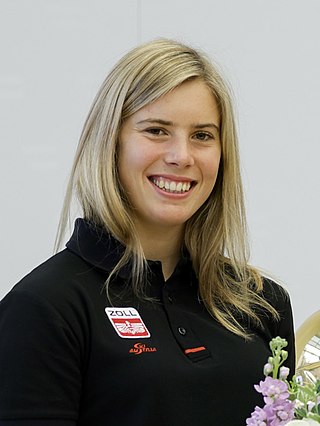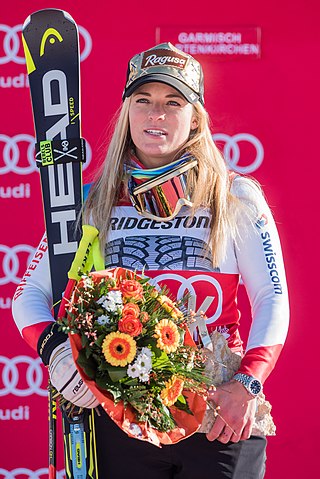
The International Ski Federation (FIS) Alpine Ski World Cup was the premier circuit for alpine skiing competition. The inaugural season launched in January 1967, and the 2018–19 season marks the 53rd consecutive year for the FIS World Cup.

The International Ski Federation (FIS) Alpine Ski World Cup, the premier circuit for alpine skiing competition, began in January 1967, and the 2019–20 season marked the 54th consecutive year for the FIS World Cup. As it had every year since 2006, the season began in Sölden, Austria in October. The season was supposed to end with the World Cup finals in March, which were to be held in Cortina d'Ampezzo, Italy for the first time since they began in 1993, but the finals were cancelled due to the COVID-19 outbreak in Italy.

The International Ski Federation (FIS) Alpine Ski World Cup was the premier circuit for alpine skiing competition. The inaugural season launched in January 1967, and the 2020–21 season marked the 55th consecutive year for the FIS World Cup. As it had every year since 2006, the season began in Sölden, Austria in October, and it ended with the World Cup finals in March, which were held in Lenzerheide, Switzerland. However, the COVID-19 pandemic forced many changes to the original racing schedule. Among them were the following:

The women's slalom in the 2021 FIS Alpine Skiing World Cup consisted of 9 events, as planned.

The women's giant slalom in the 2021 FIS Alpine Skiing World Cup consisted of 8 events including the final in Lenzerheide, Switzerland. The original schedule had included nine events, but a race in Semmering had to be cancelled after the first run had already been completed when hurricane-force winds moved in and caused significant damage, including to the timing equipment.

The men's giant slalom in the 2020 FIS Alpine Skiing World Cup involved seven events, as the last two scheduled giant slaloms in the season were cancelled.

The women's giant slalom in the 2020 FIS Alpine Skiing World Cup involved 6 events. The season had been scheduled for nine events, but all of the last three giant slaloms were canceled.

The women's giant slalom in the 2023 FIS Alpine Skiing World Cup included ten events, including the final. The season was scheduled to open in Sölden, Austria on 22 October 2022, but the race was cancelled due to bad weather and rescheduled to Semmering, Austria on 27 December.

The women's super-G in the 2019 FIS Alpine Skiing World Cup involved 6 events, including the finals in Soldeu, Andorra. Originally, the season had been planned to hold 8 events, but the two races scheduled in Sochi, Russia were cancelled due to continuing heavy snowfall.

The women's giant slalom in the 2019 FIS Alpine Skiing World Cup involved 8 events.

The women's slalom in the 2019 FIS Alpine Skiing World Cup involved 12 events, including three parallel slaloms. At the end of the season, a new discipline was created for parallel races.

The women's giant slalom in the 2018 FIS Alpine Skiing World Cup involved eight completed events. When the World Cup finals race scheduled in Åre, Sweden was cancelled due to high winds, Viktoria Rebensburg of Germany, who had won three races during the season and held a 92-point lead over defending champion Tessa Worley of France in the discipline standings before the finals, was crowned as discipline champion for the season.

The women's slalom in the 2018 FIS Alpine Skiing World Cup involved 12 events, including three parallel races and the season finale in Åre, Sweden.

The women's giant slalom in the 2017 FIS Alpine Skiing World Cup consisted of nine events, including the World Cup finals in Aspen, Colorado (USA). Tessa Worley of France had never won a season-long championship in the World Cup but this season had reached the giant slalom podium seven times, including three wins, and held an 80-point lead over runner-up Mikaela Shiffrin of the US in the standings before the finals. In the finals, Worley finished fifth and became a first-time discipline champion.

The women's slalom in the 2017 FIS Alpine Skiing World Cup involved 10 events, including one parallel slalom and the season finale in Aspen, Colorado (USA).

The men's giant slalom in the 2017 FIS Alpine Skiing World Cup involved nine events, including the second-ever parallel giant slalom and the season finals in Aspen, Colorado (USA). Marcel Hirscher of Austria won four of the races this season and finished second in four others, easily winning the discipline for the third straight season on his way to his sixth straight overall World Cup championship. Hirscher was so dominant during the season that much of the focus in the news coverage by the end of the season was about his desire to continue, considering the pressure on him to win.

The women's downhill competition in the 2016 FIS Alpine Skiing World Cup involved nine events, including the season finale in St. Moritz, Switzerland.

The women's slalom competition in the 2016 FIS Alpine Skiing World Cup involved 11 events, including one parallel slalom and the season finale in St. Moritz, Switzerland.

The men's giant slalom competition in the 2016 FIS Alpine Skiing World Cup involved eleven events, including the first-ever parallel giant slalom and the season finals in St. Moritz, Switzerland. The newly introduced Parallel giant slalom event at Alta Badia, Italy was a relatively short Giant slalom course that pitted the men against one another in a modified bracket-reduction format from a field of thirty-two qualifying skiers, eventually whittled down to just four final-round racers in a "large final" and a "small final".

The women's giant slalom in the 2024 FIS Alpine Skiing World Cup included eleven events, including the final. The season opened in Sölden, Austria on 28 October 2023. After an injury to defending champion Mikaela Shiffrin of the United States, the season championship became a battle between Lara Gut-Behrami of Switzerland and Federica Brignone of Italy, which went down to the last race of the season at the finals in Saalbach-Hinterglemm, Austria before Gut-Behrami triumphed.















